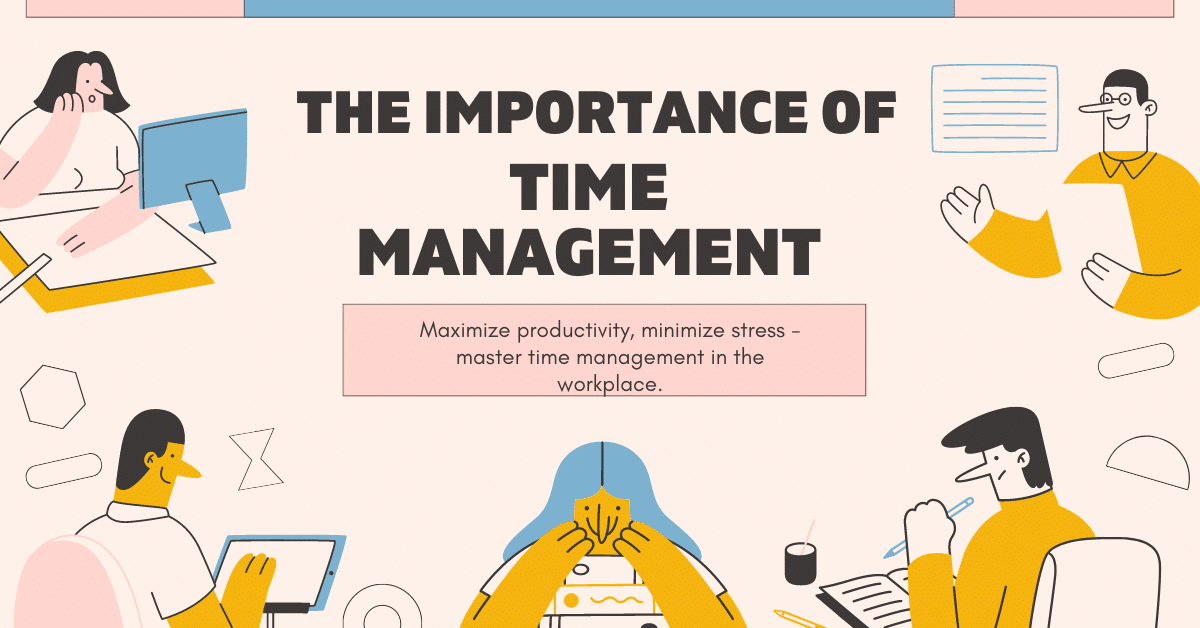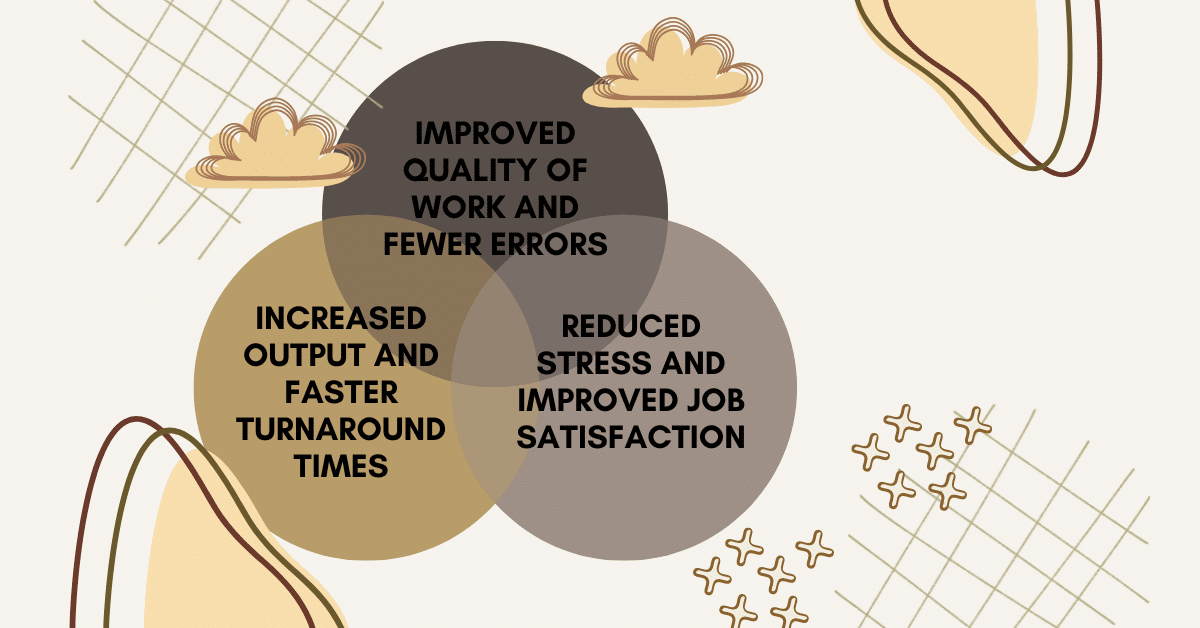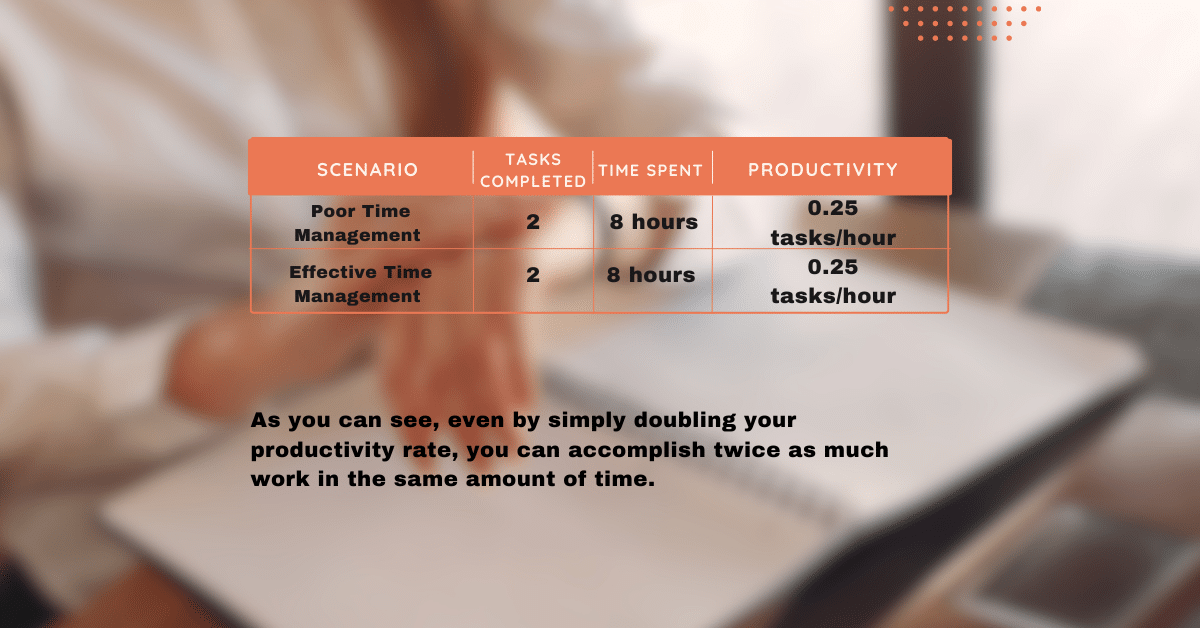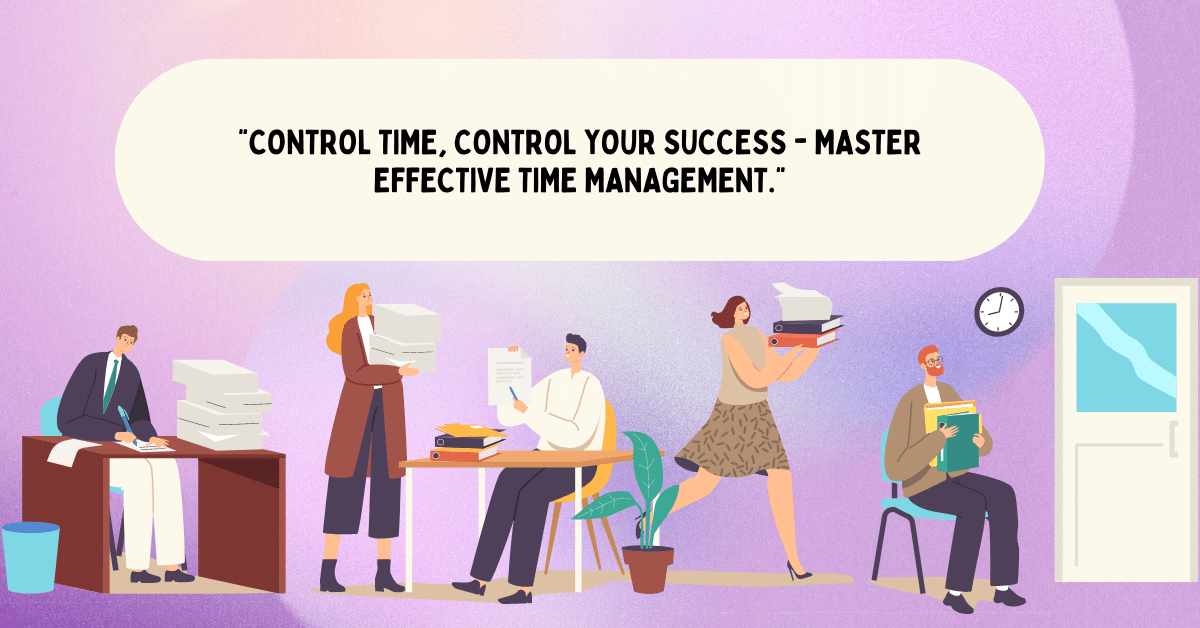Time management is a critical skill that can greatly impact your success in the workplace. Effective time management allows you to be more productive, meet deadlines, and achieve your goals. However, poor time management can lead to missed deadlines, decreased productivity, and even burnout. In this post, we’ll explore the importance of time management in the workplace, and provide tips and strategies to help you improve your time management skills.

The Consequences of Poor Time Management for Your Work Performance
Poor time management can have significant consequences on your work performance. When you fail to manage your time effectively, you may find yourself struggling to meet deadlines, missing important meetings, or failing to complete tasks on time. This can lead to decreased productivity, increased stress, and even a damaged reputation among your colleagues and superiors. Additionally, poor time management can make it difficult to maintain a healthy work-life balance, leading to burnout and reduced job satisfaction. By recognizing the consequences of poor time management, you can take steps to improve your skills and avoid these negative outcomes.
The Benefits of Effective Time Management for Your Career Growth
Effective time management is critical to achieving career growth and success. It enables you to prioritize tasks and work towards accomplishing your goals, while also preventing burnout and reducing stress. With good time management skills, you can increase your productivity, demonstrate your ability to meet deadlines and improve your overall work quality. Additionally, effective time management allows you to create a healthy work-life balance, providing you with the opportunity to pursue personal goals and interests outside of work. Ultimately, mastering time management is an essential component of professional development and can help you progress in your career.
Improved Productivity and Efficiency
Effective time management can significantly improve your productivity and efficiency in the workplace. By prioritizing your tasks, breaking them down into manageable chunks, and scheduling time for each, you can stay focused and on track. This can help you complete your work more quickly and accurately, freeing up time for other tasks or projects. Some specific benefits of improved productivity and efficiency through time management may include:

To illustrate the potential impact of improved productivity, consider the following table:

Increased Opportunities for Professional Development
Effective time management can also create more opportunities for professional development and career growth. When you manage your time well, you can more easily prioritize important tasks and focus on long-term goals. This can help you take on new projects, develop new skills, and demonstrate your value to your employer. Some potential benefits of increased opportunities for professional development through time management may include:
- Enhanced skill set and knowledge base
- Increased visibility and recognition within your organization
- More significant potential for promotions or other career advancement opportunities
To maximize your opportunities for professional development, consider the following tips:
- Set specific goals for your career development
- Create a plan of action with clear steps and deadlines
- Schedule time for learning and skill-building activities
Enhanced Work-Life Balance and Reduced Stress
Finally, effective time management can help you maintain a healthier work-life balance and reduce stress. By managing your time effectively, you can prioritize your work tasks, leaving more time for personal activities and relationships outside of work. This can help you recharge and avoid burnout, leading to improved job satisfaction and mental health. Some specific benefits of enhanced work-life balance and reduced stress through time management may include:

To achieve a better work-life balance and reduce stress, consider the following strategies:

How Time Management Can Help You Avoid Burnout and Improve Work-Life Balance

Effective time management is a powerful tool for avoiding burnout and improving your work-life balance. When you manage your time well, you can prioritize your tasks and responsibilities, ensuring that you have time for both work and personal activities. This can help you maintain a healthy work-life balance, reducing stress and preventing burnout. By taking control of your schedule and avoiding overcommitting yourself, you can ensure that you have time for self-care, hobbies, and other activities outside of work. This can help you recharge and refresh, improving your mental health and job satisfaction. To maximize the benefits of time management for avoiding burnout and improving work-life balance, consider the following tips:
- Set realistic goals and priorities for both work and personal activities
- Use time blocking or other scheduling techniques to ensure that you have time for all your responsibilities
- Be willing to delegate tasks or say no to requests that are outside of your capacity
- Prioritize self-care activities such as exercise, relaxation, and time with loved ones
By prioritizing time management in your life, you can avoid burnout, improve your work-life balance, and achieve greater success both professionally and personally.
The Role of Time Management in Team Productivity and Collaboration

In today’s fast-paced work environment, effective time management is crucial for achieving maximum team productivity and collaboration. When team members manage their time effectively, they can prioritize their tasks and responsibilities, work efficiently, and meet deadlines. Additionally, good time management practices can help teams avoid conflicts and miscommunications, as team members are better able to stay on track and work collaboratively. In this post, we will explore the role of time management in team productivity and collaboration, providing strategies and techniques for improving time management and achieving greater success as a team.
How Effective Time Management Can Improve Team Productivity
Effective time management is essential for achieving maximum team productivity. When team members manage their time effectively, they can prioritize their tasks and responsibilities, work efficiently, and meet deadlines. This can help teams complete projects more quickly and accurately, resulting in better quality work and improved outcomes. Additionally, good time management techniques and practices can help teams avoid conflicts and miscommunications, as team members are better able to stay on track and work collaboratively. To improve team productivity through time management, consider implementing the following strategies:
- Establish clear goals and timelines for projects
- Break down large projects into smaller, manageable tasks
- Schedule regular check-ins and progress updates
- Encourage open communication and collaboration among team members
The Importance of Time Management in Collaborative Work
Collaborative work often involves multiple people working on different tasks simultaneously. Effective time management is critical for ensuring that everyone is working efficiently and contributing to the project’s overall success. When team members manage their time effectively, they can coordinate their efforts, avoid conflicts, and ensure that all tasks are completed on time. Additionally, good time management practices can help team members stay focused and motivated, improving their overall job satisfaction and engagement in the project. To improve time management in collaborative work, consider implementing the following techniques:
- Use project management software to track tasks and timelines
- Schedule regular team meetings and progress updates
- Encourage open and effective communication and feedback among team members
- Use shared calendars or scheduling tools to ensure that everyone is on the same page
Techniques for Improving Team Time Management and Collaboration
Improving time management and collaboration in a team setting requires a concerted effort from all team members. To achieve maximum success, it is essential to implement effective techniques that help everyone work together efficiently and effectively. Some potential techniques for improving team time management and collaboration may include:
- Establishing clear goals and timelines for projects
- Encouraging open communication and feedback
- Using project management software or other collaboration tools
- Providing training and resources on effective time management practices
- Setting up regular check-ins and progress updates
- Rewarding and recognizing team members for their contributions
By implementing these techniques and prioritizing effective time management and collaboration, teams can achieve greater success and achieve their goals more efficiently and effectively.
Tips for Improving Time Management Skills in the Workplace
Effective time management skills are essential for success in the workplace. By managing your time well, you can prioritize tasks and responsibilities, ensure that you meet deadlines, and work efficiently to achieve your goals. However, improving time management skills can be a challenging task, especially for those who struggle with procrastination or have difficulty prioritizing tasks. To help you improve your time management skills in the workplace, consider the following tips:
- Create a to-do list at the beginning of each day and prioritize tasks based on importance and urgency
- Use a scheduling tool or time-blocking technique to manage your time effectively
- Minimize distractions by turning off notifications, closing unnecessary tabs, and focusing on one task at a time
- Break down large projects into smaller, manageable tasks to avoid feeling overwhelmed
- Take regular breaks and prioritize self-care activities to maintain focus and productivity throughout the day
By implementing these tips and making time management a priority in your daily routine, you can improve your productivity, reduce stress, and achieve greater success in your career.
In Summary

Effective time management is critical for success in the workplace. By managing time well, employees can prioritize their tasks and responsibilities, meet deadlines, and work efficiently to achieve their goals. Good time management practices can also help to reduce stress, increase job satisfaction, and improve work-life balance. In addition, time management plays a critical role in team productivity and collaboration, allowing team members to coordinate their efforts, avoid conflicts, and ensure that all tasks are completed on time. By implementing effective time management strategies and techniques, individuals and teams can achieve greater success and reach their goals more efficiently and effectively.












